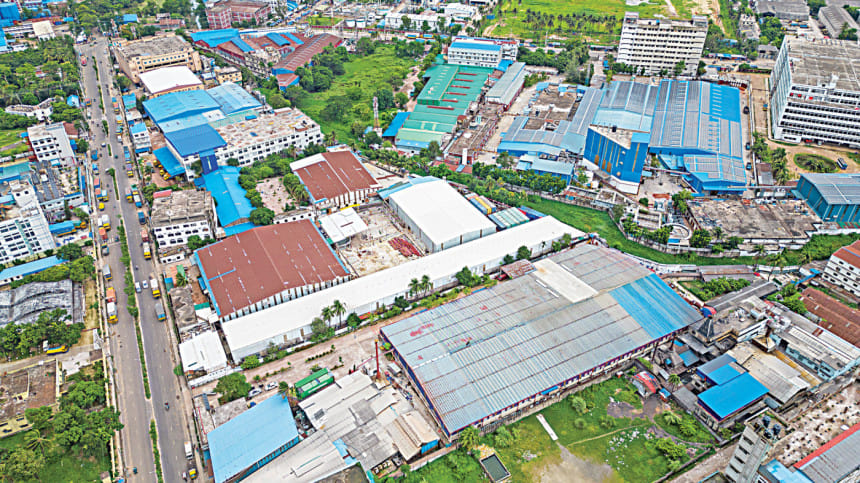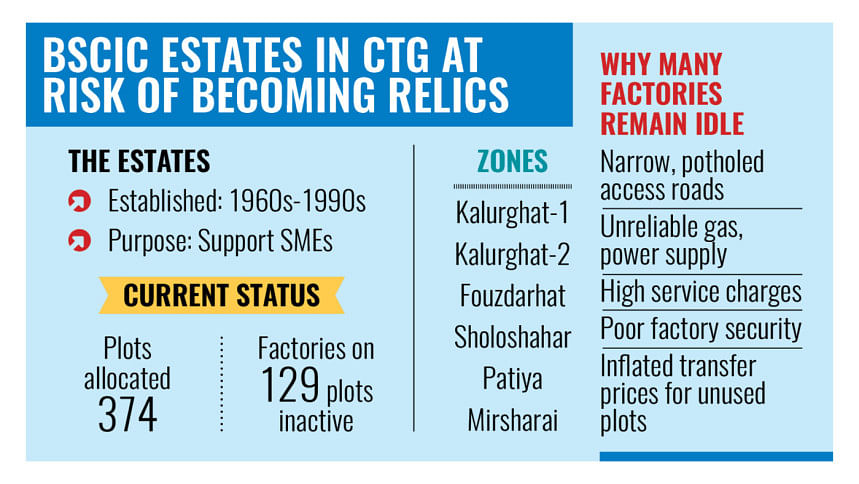One in three factories in Ctg BSCIC estates stands idle

One in three factories on six industrial estates of the Bangladesh Small and Cottage Industries Corporation (BSCIC) in Chattogram now lie idle, gathering dust due to the absence of basic infrastructure such as reliable gas and electricity, and poor access roads.
Small and medium entrepreneurs, who set up shop on these estates lured by affordable land and the promise of better utilities, now find themselves struggling with crumbling facilities.
Industrialists say the vision that once inspired these zones now risks becoming a relic of the past.
Mostly established between the 1960s and 1990s, the six BSCIC estates are Kalurghat-1, Kalurghat-2, Fouzdarhat, Sholoshahar, Patiya and Mirsharai.
They were built to support small and medium businesses. But today, only 245 out of 374 allocated plots house active factories.
Fewer than 86 of them export goods, while around 34 percent of factories across these estates have fallen silent, held back by poor road links, inconsistent power supply, weak security, and high service charges.

Khan Accessories, for instance, owns two 4,500 square feet plots in the Mirsharai estate. Although the firm invested Tk 5 crore in a carton-box factory, production has yet to begin, hamstrung by unreliable supplies of essential inputs.
"The estate suffers from chronic shortages of electricity and water," said Abdul Jalil, managing director of Khan Accessories.
He also pointed to the lack of government incentives and limited access to bank loans as key obstacles.
NGK Auto Rubber Products in Mirsharai estate also offers a similar story. The company received two plots totalling 8,100 square feet to manufacture rubber goods, but has not yet been able to start production.
Managing director Amol Barua blamed frequent power cuts, and offering power lines actually meant for homes rather than factories.
Although the Mirsharai estate was inaugurated in 2017 to attract modern industry, only eight out of its 88 plots have so far begun production.
Across all six zones, plots are often acquired speculatively, then transferred to others without any factory being built.
One such example is a 13,205 square feet plot in Sholoshahar, leased to Sadeq Silk Mills over two decades ago.
After a lease default, the land was auctioned off to Glory Industries in 2014. Yet no factory has emerged, as legal tangles and logistical hurdles remain unresolved, even though neighbouring plots are thriving.
Such inactive plots block new businesses and fresh investment.
Even the older estates, such as Kalurghat, which began in the 1960s and expanded through the 1990s, have seen better days. Of 326 plots allocated to 159 industries, only 122 are operational.
In Kalurghat, among the early entrants was C&A Group, which since 2000 had occupied nine plots for knitting, dyeing, printing, packaging and garments.
The firm shut down after defaulting on loans. Its subsidiary, C&A Textiles Ltd, once an exporter to North America and Europe, has remained closed since 2016. Although Alif Group acquired it in 2021, full operations and exports have yet to resume.
Well Group stands out as a rare success story, continuing its long-term presence in Kalurghat.
Nurul Islam, the company's chief financial officer, recalled how BSCIC's affordable land and utilities were once a draw, but said conditions have deteriorated.
"Roads are unusable, security is poor, and theft is common when factories are closed," he said.
Islam also criticised service charges at BSCIC, which he said are four times higher than taxes on private land but without matching services, making private plots more appealing.
The Chattogram District Office of BSCIC admits that limited funds make proper maintenance difficult.
SM Alamgir Quadery, deputy general manager of BSCIC, said that the budget is so tight that repairs focus only on the worst roads.
He said that gas and power shortages are national issues. Unlike BEPZA or BEZA zones, BSCIC estates do not have dedicated utility lines and have to depend on existing supply networks, which often fail to meet demand.
Although BSCIC has the authority to cancel leases on long-unused plots, most decisions are challenged in court, leading to costly and drawn-out legal battles, Quadery told The Daily Star.
He said after a five-year wait, plot owners can transfer leases at market rates, with BSCIC collecting a 5 percent fee beyond which it has little control.
The ongoing problems in old zones like Kalurghat and Sholoshahar have dented confidence in newer estates such as Mirsharai, as well as in sites planned for places like Raozan.
Quadery said, "Without affordable power and gas, SMEs cannot thrive against larger industrial competitors."
Even so, he pointed to recent discussions to revive the BSCIC estates.


 For all latest news, follow The Daily Star's Google News channel.
For all latest news, follow The Daily Star's Google News channel. 



Comments